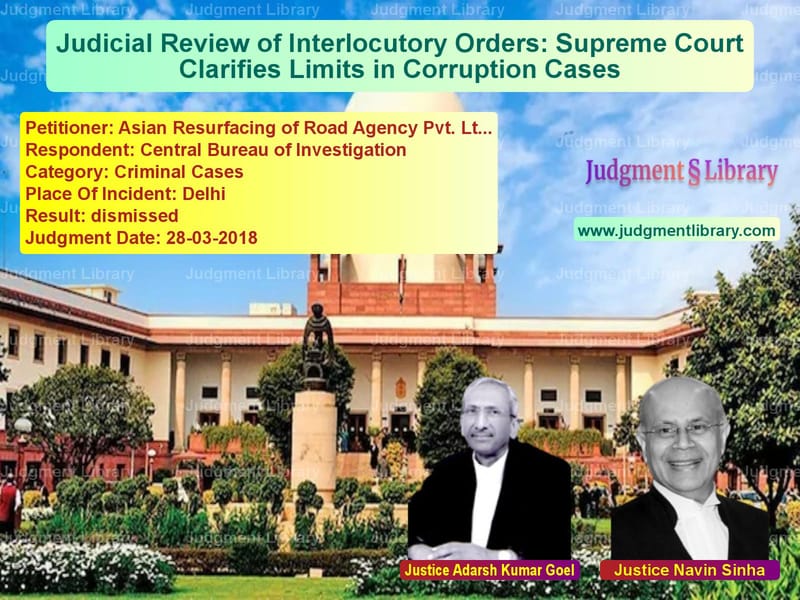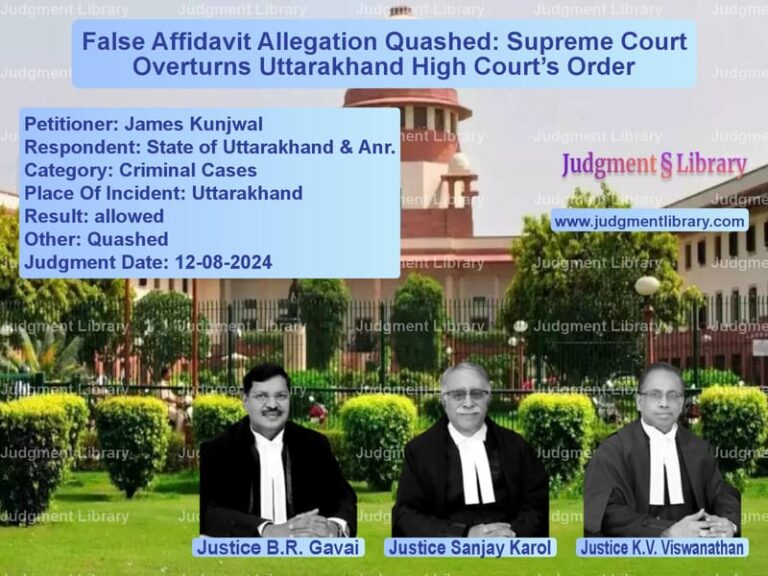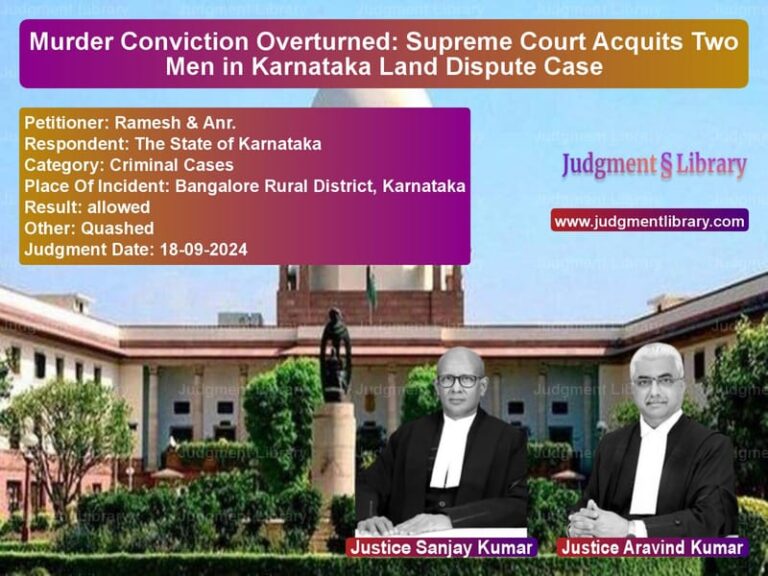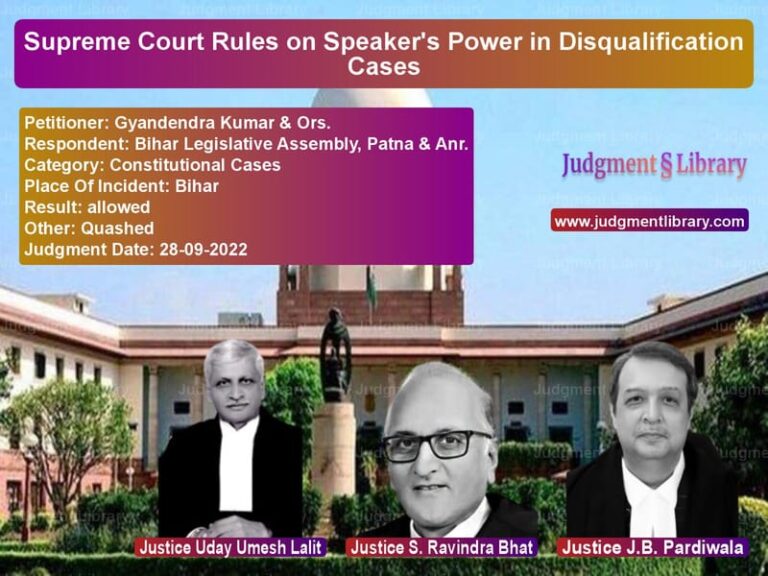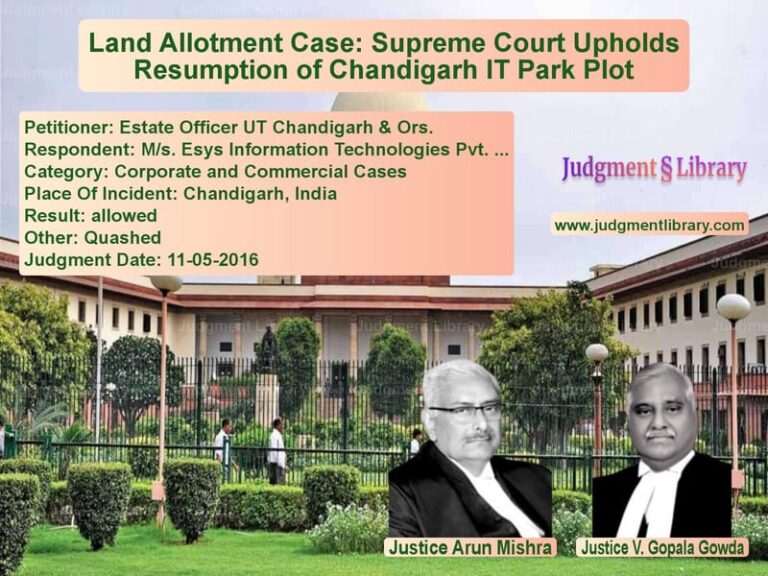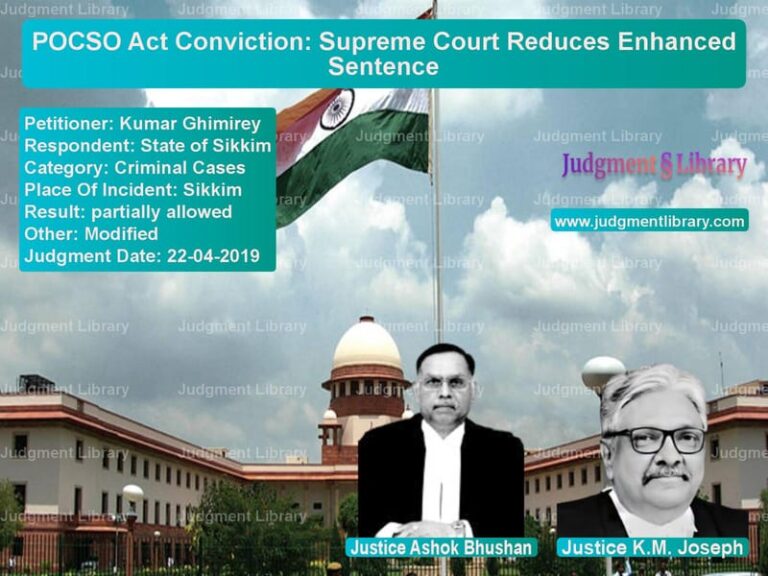Judicial Review of Interlocutory Orders: Supreme Court Clarifies Limits in Corruption Cases
The Supreme Court of India, in the case of Asian Resurfacing of Road Agency Pvt. Ltd. & Anr. v. Central Bureau of Investigation, dealt with the important issue of whether interlocutory orders, particularly in corruption cases under the Prevention of Corruption Act, 1988, could be challenged under Articles 226 and 227 of the Constitution of India, and whether proceedings could be stayed indefinitely in such cases. The ruling aims to curb the long delays in criminal trials, especially corruption cases, and ensures expeditious disposal.
Background of the Case
The case originated from a corruption investigation involving the Municipal Corporation of Delhi (MCD) and certain officials accused of causing financial losses by using fake invoices for transportation of bitumen for road construction in Delhi. The Central Bureau of Investigation (CBI) filed an FIR under multiple sections of the Indian Penal Code (IPC) and the Prevention of Corruption Act, 1988. After an investigation, charges were framed against the accused.
The accused challenged the framing of charges through a criminal revision petition before the Delhi High Court. The High Court granted a stay on the trial proceedings, leading to significant delays. The matter reached the Supreme Court, which had to decide whether such stays should be allowed indefinitely and whether interlocutory orders could be reviewed under constitutional provisions.
Key Events
- CBI registered an FIR against MCD officials and contractors for financial fraud.
- After investigation, charges were framed under the IPC and Prevention of Corruption Act.
- The accused challenged the order framing charges before the Delhi High Court.
- The High Court stayed the proceedings, leading to prolonged trial delays.
- The Supreme Court took up the matter to clarify the legality of stays on interlocutory orders.
Legal Issues Before the Supreme Court
The Supreme Court examined the following key legal issues:
- Whether the order framing charges is an interlocutory order and can be challenged under Articles 226 and 227 of the Constitution.
- Whether stays on criminal proceedings, especially corruption cases, should be indefinite.
- Whether High Courts can use their inherent powers under Section 482 of the CrPC to intervene in interlocutory orders.
- How to ensure speedy disposal of criminal trials while preserving judicial review rights.
Arguments of the Parties
Petitioner’s (Accused) Arguments
- The order framing charges was not merely interlocutory but affected their fundamental rights and should be reviewable under Articles 226 and 227.
- They had the right to challenge the legality of the charges before a higher court.
- The High Court should have the power to stay criminal proceedings to prevent injustice.
Respondent’s (CBI’s) Arguments
- The case involved public corruption and should not be delayed by repeated legal challenges.
- Allowing interlocutory order challenges would paralyze criminal trials and undermine anti-corruption efforts.
- Stays should be lifted automatically after a fixed period to prevent abuse of judicial delays.
Supreme Court’s Analysis and Judgment
The Supreme Court bench, comprising Justice Adarsh Kumar Goel and Justice Navin Sinha, delivered a landmark ruling aimed at expediting criminal trials, particularly corruption cases.
1. Nature of an Order Framing Charges
The Court ruled that an order framing charges is an interlocutory order and not a final decision. However, it acknowledged that in rare cases, High Courts could review such orders under constitutional provisions.
“Order framing charge is not purely an interlocutory order nor a final order. Jurisdiction of the High Court is not barred irrespective of the label of a petition, be it under Sections 397 or 482 Cr.P.C. or Article 227 of the Constitution.”
2. Restrictions on Staying Criminal Proceedings
The Supreme Court strongly criticized the practice of granting indefinite stays, stating:
“Where stay is granted in future, the same will end on expiry of six months unless extended by a speaking order.”
The Court directed that all pending cases where stay orders were in effect for over six months would automatically lapse unless extended by a detailed speaking order explaining the necessity of continuation.
3. Judicial Review under Articles 226 and 227
While upholding the constitutional right of review, the Court emphasized that High Courts must exercise caution and avoid re-evaluating evidence at the charge-framing stage. The ruling stated:
“Even if a challenge to the order framing charge is entertained, decision of such a petition should not be delayed. If stay is granted, it should not normally be unconditional or of indefinite duration.”
4. Expedited Disposal of Corruption Cases
The Supreme Court reinforced the need for speedy trials, especially in corruption cases, noting:
“Delay in trials affects the faith in Rule of Law and efficacy of the legal system. It affects social welfare and development.”
The Court emphasized that trials in corruption cases must proceed on a day-to-day basis and be concluded within one to two years.
Final Judgment
The Supreme Court issued the following directions:
- All stay orders on criminal proceedings will expire after six months unless extended by a reasoned order.
- High Courts must decide challenges to interlocutory orders within two to three months.
- Trials under the Prevention of Corruption Act should proceed expeditiously, with minimal judicial interference.
- Orders of charge framing should not be routinely stayed, except in exceptional cases.
Impact of the Judgment
This judgment is a significant step towards expediting criminal trials, particularly corruption cases. Key takeaways include:
- Limiting Judicial Delays: The ruling curtails unnecessary challenges to interlocutory orders that cause trial delays.
- Speedy Trials in Corruption Cases: It reinforces the requirement for timely resolution of cases under the Prevention of Corruption Act.
- Regulated Use of Stay Orders: The automatic expiration of stay orders ensures that trials are not indefinitely stalled.
Conclusion
The Supreme Court’s ruling in Asian Resurfacing of Road Agency Pvt. Ltd. & Anr. v. CBI sets a crucial precedent for preventing the misuse of judicial processes in corruption cases. By placing restrictions on indefinite stays and emphasizing expedited trials, the judgment strengthens India’s anti-corruption framework and upholds the principle of swift justice.
Petitioner Name: Asian Resurfacing of Road Agency Pvt. Ltd. & Anr.Respondent Name: Central Bureau of InvestigationJudgment By: Justice Adarsh Kumar Goel, Justice Navin SinhaPlace Of Incident: DelhiJudgment Date: 28-03-2018
Don’t miss out on the full details! Download the complete judgment in PDF format below and gain valuable insights instantly!
Download Judgment: Asian Resurfacing of vs Central Bureau of In Supreme Court of India Judgment Dated 28-03-2018.pdf
Direct Downlaod Judgment: Direct downlaod this Judgment
See all petitions in Bail and Anticipatory Bail
See all petitions in Fraud and Forgery
See all petitions in Money Laundering Cases
See all petitions in Judgment by Adarsh Kumar Goel
See all petitions in Judgment by Navin Sinha
See all petitions in dismissed
See all petitions in supreme court of India judgments March 2018
See all petitions in 2018 judgments
See all posts in Criminal Cases Category
See all allowed petitions in Criminal Cases Category
See all Dismissed petitions in Criminal Cases Category
See all partially allowed petitions in Criminal Cases Category

